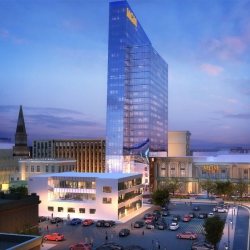
MGM Resorts invested nearly $1 billion in western Massachusetts, so the short term economic impact is certainly positive.
The Massachusetts Gaming Commission continues its multiyear project to learn the economic impact of the MGM Springfield casino, but said it is too soon to release such findings. Massachusetts officials have wanted official confirmation that an integrated resort like MGM Springfield, which cost $950 millon to build, has a positive impact on the region’s economy.
This week, the Gaming Commission called a Prof. Henry Renski of the University of Massachusetts-Amherst to give testimony. Renski discussed the economic impact of the Plainridge Park Casino in Plainville, Massachusetts.
The Plainridge facility before 2015 had been a racetrack. In 2015, casino-style gaming was added to Plainridge. Henry Renski said that the real estate surrounding Plainridge had seen a slight improvement since the casino opening.
Renski also noted that other factors within southeastern Massachusetts could have impacted the rise in real estate prices. The professor said, “There’s so much going on in the region, with the Wrentham Outlets, Patriot Place an exit away, the Xfinity Center…this casino doesn’t exist in a vacuum.”
The Amherst professor did seem to indicate the Plainridge casino was a positive factor, though. Renski added, “We found that the casino complements other destinations in the area. Together, they become a magnet.”
Defunct Rush Street Gaming Casino
Henry Renski’s testimony underscores how two sides of a casino question can submit much different reports. When Rush Street Gaming backed a commercial casino plan for Brockton, Massachusetts, RSG’s president Neil Bluhm hired Spectrum Gaming to conduct an economic impact study.
Spectrum Gaming is a respected research firm out of New Jersey. It found that the Brockton casino would have a positive impact on the area and increase casino tax revenues to the state.
Taunton v. Brockton Casinos
The Wampanoag Tribe, which had plans for the First Light Casino in nearby Taunton, claimed the Brockton casino would have a negative impact on Massachusetts casino revenues. The First Light Casino’s backers, including the Wampanoag and Genting Group out of Malaysia (Resorts World New York, Resorts World Catskills), hired researchers to conduct their own review of the economic impact.
Of course, the First Light Casino study found that the Rush Street Gaming casino and the Wampanoag/Genting casino would cannibalize each other’s business. Neither casino would be particularly healthy financially. Without sound financial health, neither would invest in renovations and expansions over the years. In the end, two casinos would lead to fewer revenues for the Commonwealth of Massachusetts.
No wonder that the Massachusetts Gaming Commission punted on the Brockton casino plan. Note: The Wampanoag casino plan remains in limbo, too.
Do Casinos Bring Prosperity to a City?
Like other business projects, casino licensing and development involves a lot of projecting. Developers always have arguments for why their plan will work, while opponents have their arguments of why a casino is only wealth redistribution.
Casino developers tend to put forward their ideas with confidence, even brashness. That does not mean they are deceptive — it’s just that the economic data is interpretive.
Will MGM Springfield Help Western Massachusetts?
Whatever the case, whenever a Las Vegas company invests $960 million in western Massachusetts, that is likely to have a positive economic impact on the area in the short term at the very least. Such money creates thousands of temporary jobs in construction. It also creates thousands of permanent jobs in casino staff positions.
Opponents would argue that the jobs created and the taxes generated for the state are offset by the gambling losses by local residents. In their minds, it is wealth redistribution, not real wealth creation. That might be true, if the only gamblers at the MGM Springfield are local residents.
At a time, casinos were destination resorts for gamblers all over a region. Atlantic City casinos and tribal casinos in Connecticut drew in players from all over the region, so it creates prosperity in the area surrounding the casino. In an era with market saturation and a fragmented casino market, the casino industry is more localized than it once was. The longterm economic impact might not be what it once was.
Rachel Volberg of SEIGMA
Eventually, the Massachusetts Gaming Commission will publish a report on the impact of MGM Springfield. Rachel Volberg, the Social and Economic Impacts of Gambling in Massachusetts’s (SEIGMA) principal investigator, said of the research, “We’ve already begun to study MGM. And I expect we’ll have enough data to publish a report in about a year, but it’s not going to stop there. We’re going to continue to monitor impact and report on it.”
Mark Vander Linden, Massachusetts’ director of research and responsible gaming, said of the MGC’s ongoing research, “We can’t go into this with any assumptions. It’s important to avoid expectations so we can really find what the greatest impacts are. We are really most focused on the question of ‘Now what?’ We want to be able to use this research to make changes if we find they are needed.”
That is good advice by Mark Vander Linden, but hard advice to take. By the time report is available, MGM Springfield will have been in operation for more than a year. It will be a sunk cost and Massachusetts officials will be beyond the point of recall. The data will be interpretive, and those involved in decision making will be looking to justify their decisions. Expect to hear a positive report on MGM Springfield’s economic impact.
